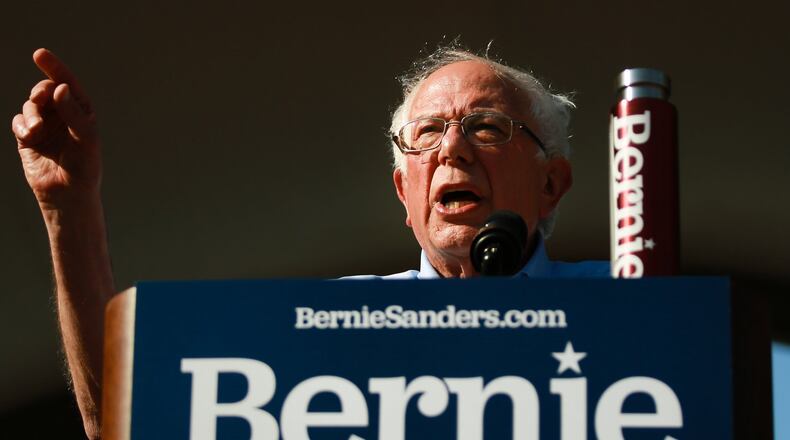If U.S. Sen. Bernie Sanders is going to win Georgia’s Democratic presidential primary, as he vowed Saturday at his first campaign appearance in the state this cycle, he’s going to need voters like Wade Jackson.
Jackson, 40, actually voted for Sanders in 2016 when he won just better than a quarter of the vote against Hillary Clinton. The lopsided result was due largely to Clinton’s overwhelming support from African-American residents.
This time around, Jackson, a black Georgia voter, said he’s undecided for now about which Democrat he’ll support. He’s still considering a few of the nearly two dozen Democrats who have entered the presidential race.
“People are waiting to see if he is who he says he is,” Jackson said. Coming to Augusta was a good start, he said.
“He’s got to come to our communities and ask for our support,” Jackson said.
Without them, Sanders doesn't likely have a chance of winning any of the Southern states, where black voters make up the largest bloc of the Democratic electorate.
“He’s done his homework this time,” said Kenneth Sullivan, a 25-year-old African-American voter. The Augusta resident said he noticed black faces everywhere behind the scenes, although there still weren’t many in the crowd of nearly 1,600 people who attended Sanders’ speech at the Jessye Norman Amphitheatre on the shore of the Savannah River.
Credit: Elijah Nouvelage
Credit: Elijah Nouvelage
Sanders was introduced by black activist/author Cornel West, who has been front and center in Sanders’ outreach to African-American voters.
“This goes far beyond skin pigmentation. It’s not about sexual orientation,” West told the crowd. “It’s about truth.”
In his speech, Sanders quoted abolitionist Frederick Douglass and touted his new education plan named after Thurgood Marshall, America’s first black Supreme Court justice.
But the centerpiece of his campaign pitch remains economic inequality.
“You are living in the wealthiest country in the history of time and you have people working two or three jobs just to get by,” Sanders said. Some of the most expensive homes in Augusta loomed in the background. “For the first time, the younger generation will have a lower standard of living than their parents.”
He said proposals he made four years ago that were considered radical at the time now have mainstream support.
“I get accused of being radical and extreme. I am not,” he said. “The American people believe in Medicare for all. The American people believe if you work 40 hours a week you should not be living in poverty. The American people think the minimum wage should be raised to $15 an hour.”
In 2016, Sanders was criticized by some for focusing almost solely on economic matters at the exclusion of social issues tied to race and gender. But on Saturday, he denounced restrictive new abortion laws passed in Georgia, Alabama and elsewhere and “the broken and racist criminal justice system.”
He also leveled sharp broadsides against Georgia Gov. Brian Kemp and President Donald Trump.
“If you don’t have the guts to participate in fair, full and open elections get the hell out of politics,” he said, referencing Georgia’s governor.
Then, appealing to a belief among some Democrats that the election was rigged in Kemp’s favor since he served as overseer of the state’s election system while he was campaigning against Democrat Stacey Abrams, Sanders drew his biggest applause of the afternoon when he said, “And I know that Gov. Abrams agrees with me.”
Sanders also reached out to Trump voters, saying he understood why many found his message appealing.
“You’re worried your job might go to China,” he said. “You’re worried your kid might not be able to afford college.”
“Unfortunately, it turns out Donald Trump is a pathological liar and what he told the American people he had no intention of fulfilling,” he said.
The choice in 2020, Sanders concluded, was between “an oligarchy, to an even more authoritarian government, with a president who holds the Constitution in disdain.”
“I have a better alternative, to bring our people together with an agenda that works for all of us and not just our wealthy campaign contributors,” he said.
About the Author
Keep Reading
The Latest
Featured





